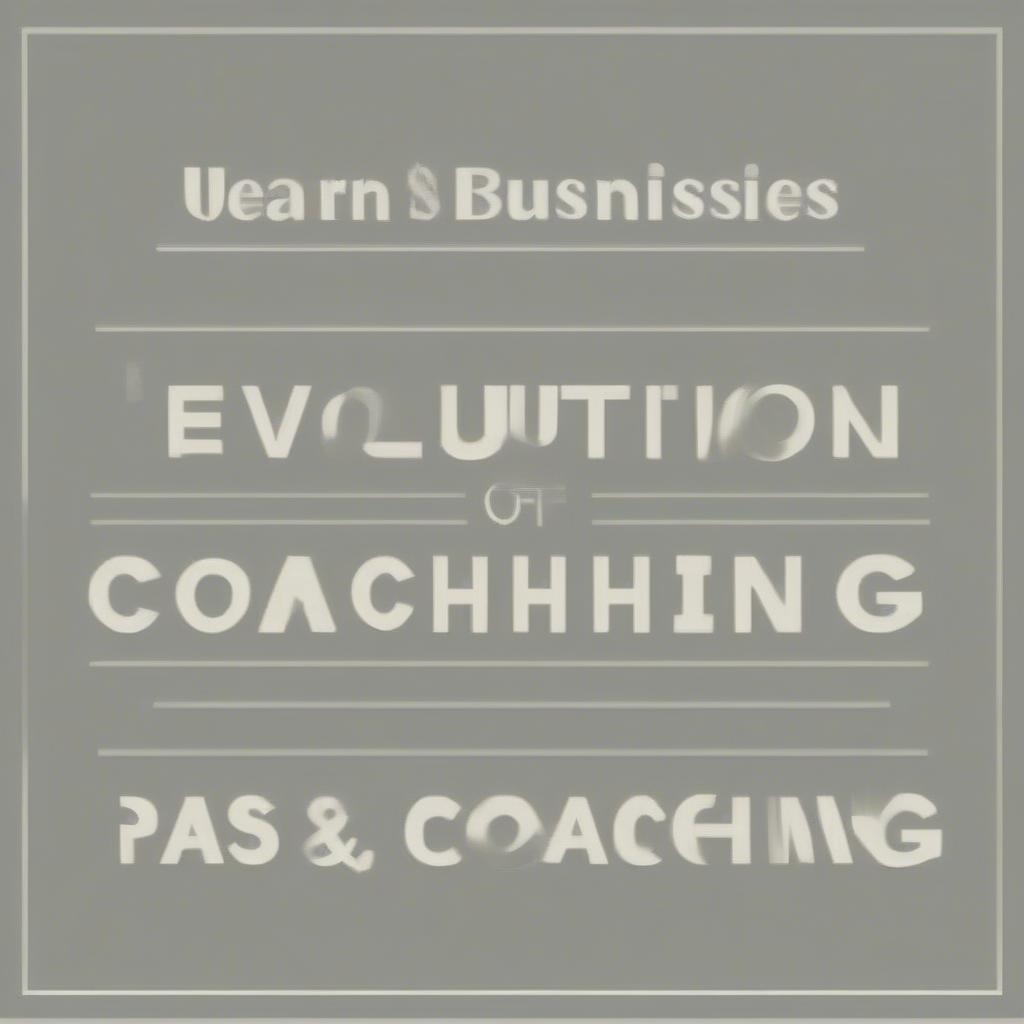
The coaching industry is a vibrant, ever-evolving landscape, constantly shaped by technological advancements, shifting societal priorities, and a growing understanding of human potential. If you’re a coach, aspiring coach, or simply interested in personal and professional growth, staying ahead of the curve is crucial. This article delves into the key trends impacting the coaching world, offering practical insights and actionable strategies to help you navigate this dynamic field.
The Rise of Niche Coaching
Gone are the days of generalist coaches. Today, clients are seeking specialized expertise and personalized guidance. This trend toward niche coaching is driven by a desire for deeper, more impactful results.
What is Niche Coaching?
Niche coaching involves focusing on a specific area or target audience. Instead of offering broad coaching services, a niche coach concentrates their expertise on a particular problem, skill, or demographic. This allows for:
- Deeper Expertise: Coaches can become true masters in their chosen area, developing a nuanced understanding of their clients’ challenges.
- Targeted Marketing: It becomes easier to attract the right clients because your message is highly relevant to their needs.
- Higher Fees: Specialization often commands higher fees as clients are willing to invest in expertise.
- Stronger Results: Clients see better outcomes because the coaching is tailored to their specific circumstances.
Examples of Niche Coaching
The possibilities are vast, but here are a few examples to get you thinking:
- Executive Presence Coaching: Helping leaders develop confidence and impact in their communication.
- Career Transition Coaching: Guiding individuals through career changes and job searches.
- Health and Wellness Coaching for Entrepreneurs: Supporting business owners in managing stress and maintaining well-being.
- Relationship Coaching for Blended Families: Navigating the unique dynamics of step-parenting and remarriage.
- Financial Wellness Coaching for Creatives: Helping artists and freelancers manage their finances and build sustainable careers.
How to Identify Your Niche
- Reflect on Your Passions and Expertise: What are you naturally good at? What topics do you genuinely enjoy exploring?
- Identify Market Needs: What problems do people struggle with that you can solve? Research your potential niche and see if there is demand.
- Assess Your Unique Strengths: What makes you different from other coaches? What unique perspective can you bring to the table?
- Test Your Niche: Offer free or discounted coaching in your chosen niche to get feedback and refine your approach.
- Commit and Become an Expert: Once you’ve found your niche, fully immerse yourself in learning and development to be the best coach you can be.
The Integration of Technology in Coaching
Technology is not replacing human connection in coaching; it’s amplifying it. The digital revolution has opened doors for coaches to reach clients globally, streamline their operations, and enhance the overall coaching experience.
Online Coaching Platforms
Gone are the days of only face-to-face sessions. Online platforms are now the norm, offering:
- Flexibility and Accessibility: Coaches can work with clients from anywhere in the world, and clients can access coaching from the comfort of their homes.
- Video Conferencing: Platforms like Zoom, Google Meet, and Microsoft Teams provide high-quality video and audio communication, allowing for real-time interaction.
- Scheduling and Calendar Tools: Automation tools help manage appointments, send reminders, and streamline the scheduling process.
- Document Sharing and Collaboration: Coaches and clients can easily share documents, worksheets, and other resources through secure online platforms.
Artificial Intelligence (AI) and Coaching
While not intended to replace human coaches, AI can be a valuable tool for:
- Personalized Feedback and Analysis: AI can analyze client data to provide insights and personalized recommendations.
- Chatbots and Automated Communication: AI-powered chatbots can answer basic questions and provide support outside of scheduled coaching sessions.
- Resource Curation: AI can help coaches find relevant articles, videos, and other resources to share with clients.
- Administrative Tasks: AI can automate tasks like scheduling, billing, and customer service, freeing up the coach’s time to focus on coaching.
Mobile Apps for Coaching
Mobile apps provide clients with easy access to coaching resources on the go:
- Goal Tracking and Progress Monitoring: Apps can help clients track their progress, celebrate wins, and identify areas for improvement.
- Journaling and Reflection: Clients can use apps to record their thoughts, feelings, and insights.
- Access to Resources and Exercises: Coaches can share exercises, meditations, and other resources directly through mobile apps.
- Push Notifications and Reminders: Apps can send push notifications to keep clients engaged and accountable.
How to Leverage Technology
- Choose the Right Platform: Select an online platform that aligns with your coaching style and your clients’ needs.
- Embrace Automation: Use automation tools to streamline your administrative tasks.
- Explore AI-Powered Resources: Experiment with AI-powered tools to see how they can enhance your coaching practice.
- Consider Mobile App Development: If you have a larger coaching business, you might even consider creating a mobile app for your clients.
- Ensure Data Security: Protect your clients’ data by using secure platforms and following best practices for data privacy.
The Growing Emphasis on Mental Health and Well-being
The global conversation around mental health and well-being is impacting the coaching industry significantly. Clients are increasingly seeking support not just for professional success but also for overall well-being, leading to new coaching specializations.
Coaching for Stress Management and Resilience
Coaches are playing an important role in helping individuals manage stress and develop resilience:
- Mindfulness and Meditation: Coaches are incorporating mindfulness techniques into their sessions to help clients manage stress and find inner peace.
- Emotional Intelligence: Coaches help clients understand and manage their emotions, building healthier relationships and reducing reactivity.
- Stress Reduction Techniques: Coaches teach clients practical tools for reducing stress, such as breathing exercises, time management skills, and boundary setting.
- Resilience Building: Coaches help clients develop coping mechanisms to overcome challenges and bounce back from setbacks.
Coaching for Work-Life Balance
Clients are increasingly seeking support in balancing their professional and personal lives:
- Time Management Strategies: Coaches help clients prioritize tasks, manage their schedules effectively, and avoid burnout.
- Boundary Setting: Coaches help clients set healthy boundaries between work and personal life, preventing overcommitment.
- Lifestyle Design: Coaches work with clients to create a life that aligns with their values, promoting fulfillment and happiness.
- Identifying and Addressing Stressors: Coaches help clients pinpoint the specific factors contributing to their stress and develop strategies for managing or eliminating them.
How to Incorporate Well-being into Coaching
- Prioritize Self-Care: Coaches should prioritize their well-being to avoid burnout and be fully present for their clients.
- Integrate Mindfulness Techniques: Incorporate mindfulness into your coaching sessions to help clients find calm and focus.
- Promote Emotional Intelligence: Help clients understand and manage their emotions, fostering healthier relationships and decision-making.
- Focus on Holistic Well-being: Take a holistic approach to coaching, addressing physical, mental, and emotional needs.
- Create a Safe Space: Offer a non-judgmental and supportive space where clients can feel comfortable sharing their struggles.
The Increased Demand for Accountability and Results
Clients are becoming more discerning, wanting coaches who deliver tangible results and hold them accountable. This trend emphasizes the need for coaches to demonstrate their value and track client progress effectively.
Setting Measurable Goals
Coaches and clients need to collaborate to establish specific, measurable, achievable, relevant, and time-bound (SMART) goals:
- Clarity and Focus: Clear goals provide direction and help both coach and client stay on track.
- Progress Tracking: Measurable goals allow for tracking progress and celebrating successes.
- Accountability: Goals create a framework for accountability, ensuring that the client remains committed to their journey.
- Motivation: Achieving goals boosts motivation and fuels continued progress.
Tracking Progress and Outcomes
Regular monitoring of progress is essential to ensure that coaching is delivering results:
- Regular Check-ins: Conduct regular check-ins to assess progress, identify challenges, and adjust the coaching plan as needed.
- Progress Tracking Tools: Use online tools or spreadsheets to track progress and visualize outcomes.
- Client Self-Assessment: Encourage clients to reflect on their progress and identify areas for further development.
- Feedback Mechanisms: Solicit feedback from clients regularly to improve the coaching process.
Demonstrating Value and ROI
Coaches need to be able to clearly demonstrate the value and return on investment of their services:
- Testimonials and Case Studies: Gather testimonials from satisfied clients and showcase successful case studies.
- Data-Driven Results: Track metrics such as client progress, goal achievement, and improved performance.
- Return on Investment (ROI) Calculation: Help clients understand the potential financial benefits of coaching.
- Communication of Value: Clearly communicate the value you bring as a coach, highlighting the positive impact on your clients’ lives.
How to Ensure Accountability
- Collaborative Goal Setting: Involve clients in setting their goals to increase buy-in and accountability.
- Regular Progress Checks: Conduct regular check-ins to monitor progress and hold clients accountable for their actions.
- Action Plans and Deadlines: Create clear action plans with specific deadlines to ensure that clients take the necessary steps.
- Supportive Accountability: Provide a supportive and encouraging environment that fosters accountability without judgment.
- Celebration of Successes: Acknowledge and celebrate milestones and achievements to maintain motivation and momentum.
The Importance of Diversity, Equity, and Inclusion (DEI) in Coaching
The coaching industry is increasingly recognizing the importance of diversity, equity, and inclusion. Coaches must create inclusive environments that honor and support the unique experiences of all clients.
Cultural Competence
Coaches must develop cultural competence to effectively work with clients from diverse backgrounds:
- Self-Awareness: Understand your own biases and cultural perspectives.
- Cultural Sensitivity: Be respectful of different cultural norms and values.
- Active Listening: Listen attentively to understand the client’s perspective, acknowledging their unique life experiences.
- Language Proficiency: If necessary, learn to communicate effectively with clients who speak different languages.
Inclusive Coaching Practices
Implement inclusive coaching practices that promote equity and respect:
- Accessibility: Ensure that coaching services are accessible to individuals with disabilities.
- Diversity in Resources: Use diverse examples and case studies in your coaching materials.
- Language Sensitivity: Use gender-neutral language and avoid terms that may be offensive or discriminatory.
- Representation: Ensure representation of diverse voices and perspectives in your marketing materials and online presence.
Creating a Safe and Welcoming Space
Establish a coaching environment where all clients feel safe, welcome, and respected:
- Confidentiality: Assure clients that their information will be kept confidential.
- Non-judgmental Approach: Approach clients with openness, empathy and without bias.
- Active Validation: Validate the experiences and perspectives of all clients.
- Cultural Awareness: Stay informed about relevant cultural events and issues to better understand your clients.
How to Promote DEI in Coaching
- Educate Yourself: Continuously learn about diversity, equity, and inclusion through courses, workshops, and readings.
- Seek Feedback: Solicit feedback from clients about your inclusivity and make adjustments as needed.
- Be a Role Model: Demonstrate inclusivity in your own actions and behaviors.
- Challenge Bias: Actively challenge bias and discrimination wherever you encounter it.
- Advocate for Equity: Use your platform as a coach to advocate for equity and social justice.
The Shift Towards Customized Coaching Experiences
Clients are no longer satisfied with one-size-fits-all approaches. They are seeking highly customized coaching experiences that align with their unique needs, goals, and preferences.
Personalized Coaching Plans
Personalized coaching plans are tailored to meet each client’s specific circumstances and desired outcomes:
- Individual Needs Assessment: Conduct a thorough assessment of each client’s needs, goals, and challenges.
- Customized Strategies: Develop coaching strategies that are tailored to the client’s specific situation.
- Flexible Approach: Adjust the coaching plan as the client’s needs evolve.
- Collaborative Approach: Involve the client in the planning process to ensure their buy-in and motivation.
Tailored Communication Styles
Adapt your communication style to effectively connect with each client:
- Preferred Communication Channels: Utilize communication channels that align with the client’s preferences (e.g., phone calls, video conferences, email, text).
- Active Listening: Listen actively to understand the client’s communication style and preferences.
- Clear and Concise Language: Use language that is clear, concise, and easy for the client to understand.
- Feedback and Adjustment: Be open to feedback on your communication style and make adjustments as needed.
Flexible Coaching Modalities
Offer a variety of coaching modalities to meet different client needs:
- Individual Coaching: One-on-one coaching sessions tailored to the client’s unique needs.
- Group Coaching: Coaching sessions conducted in a group setting, allowing for peer support and learning.
- Online Coaching: Coaching sessions delivered online through video conferencing or other digital platforms.
- Hybrid Coaching: A combination of in-person and online coaching sessions to maximize flexibility and convenience.
How to Customize the Coaching Experience
- Conduct Thorough Assessments: Take time to understand each client’s individual needs, goals, and challenges.
- Create Personalized Plans: Develop coaching plans that are tailored to the client’s specific situation.
- Adapt to Client Preferences: Be flexible and adapt your communication style and modalities to meet the client’s needs.
- Collaborate with Clients: Involve clients in the planning process to ensure their buy-in and motivation.
- Continuously Evaluate and Adjust: Regularly evaluate the effectiveness of the coaching plan and make adjustments as needed.
The Growing Importance of Coach Training and Certification
As the coaching industry continues to professionalize, formal training and certification are becoming increasingly important for coaches to establish credibility and demonstrate expertise.
The Benefits of Coach Training
Formal coach training programs provide aspiring and experienced coaches with:
- Fundamental Coaching Skills: Develop core coaching skills such as active listening, effective questioning, and powerful communication.
- Coaching Models and Frameworks: Learn established coaching models and frameworks that can be applied to different client situations.
- Ethical Considerations: Understand the ethical principles that govern the coaching profession.
- Practical Experience: Gain valuable hands-on experience through practice coaching sessions.
- Personal Development: Enhance your self-awareness and develop your own coaching style.
The Value of Coach Certification
Professional coach certification demonstrates a commitment to excellence and helps coaches stand out in the marketplace:
- Credibility and Trust: Certification from a reputable organization builds credibility and trust with potential clients.
- Professional Recognition: Certification provides professional recognition and validation of coaching skills.
- Market Differentiation: Certification helps coaches differentiate themselves from non-certified coaches.
- Continuing Education: Many certifications require ongoing continuing education, encouraging continuous learning and development.
- Higher Earning Potential: Certified coaches often have higher earning potential compared to non-certified coaches.
How to Choose the Right Training and Certification
- Accreditation: Look for training programs and certification organizations that are accredited by reputable bodies.
- Curriculum: Evaluate the curriculum to ensure that it covers the core competencies and skills you need.
- Faculty: Research the faculty and ensure they are experienced and qualified coaches.
- Cost and Time Commitment: Consider the cost of the program and the time commitment required to complete it.
- Learning Style: Choose a program that aligns with your learning style and preferences.
Learn Business: Your Partner in Coaching Success
At Learn Business, we understand the complexities of building and growing a thriving coaching practice. That’s why we offer a range of resources, templates, and guidance to support you every step of the way. Whether you’re a new coach just starting or an established professional looking to scale, Learn Business provides the tools you need to succeed.
How Learn Business Supports Coaches
- Business Planning Templates: Develop a clear and actionable business plan with our customizable templates.
- Marketing and Branding Guidance: Create a strong brand identity and attract your ideal clients with our marketing support.
- Sales and Pricing Strategies: Learn how to effectively sell your coaching services and set prices that reflect your value.
- Client Management Tools: Organize your client interactions, track progress, and manage your schedule with ease.
- Legal and Financial Resources: Access essential legal and financial templates to ensure your business is compliant and profitable.
- Community and Support: Connect with other coaches, share ideas, and get support from our community.
- Customized Solutions: We recognize that each business is unique and offer tailored resources for different types of coaching businesses.
Templates Tailored for Coaching Businesses
Our templates are designed specifically for coaches and include:
- Client Intake Forms: Gather essential client information efficiently with pre-built intake forms.
- Coaching Session Notes Templates: Keep accurate and organized records of each coaching session.
- Goal Setting Worksheets: Facilitate goal setting with easy-to-use client goal templates.
- Progress Tracking Tools: Monitor client progress and measure outcomes with progress tracking templates.
- Marketing Materials: Create professional marketing materials, such as brochures and social media posts, with our customizable templates.
- Contract Templates: Protect your business with professionally drafted contract templates.
- Pricing and Packaging Templates: Develop your pricing structure and package your coaching offerings effectively.
Learn Business: Your Path to Success
By leveraging our resources, guidance, and templates, you can build a thriving coaching practice that aligns with your values and goals. We provide the tools and support you need to navigate the ever-changing coaching industry with confidence. Don’t navigate your coaching journey alone. Let Learn Business be your partner in success.
Navigating the Future of the Coaching Industry
The coaching industry is poised for continued growth and transformation. By staying ahead of these key trends, you can position yourself for success, build a thriving coaching practice, and make a positive impact on the lives of your clients. Embrace the changes, adapt to new technologies, and never stop learning and growing. The future of coaching is bright, and by implementing the strategies mentioned above you can thrive and excel. You can start now and build the coaching practice you always wanted.



Leave a Reply